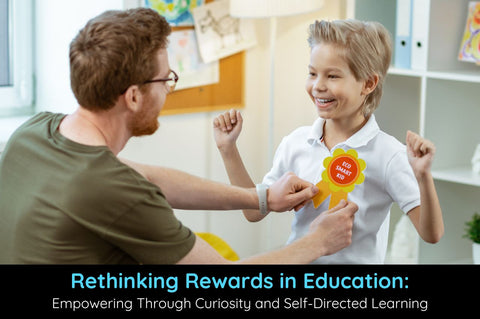Rethinking Rewards in Education: Empowering Kids Through Self-Directed Learning

The Montessori method distinguishes itself from other educational models in its emphasis on fostering intrinsic motivation and curiosity-driven exploration. Central to this philosophy is the belief that true learning occurs when children are empowered to explore their interests at their own pace, without the need for external praise or rewards. However, recent studies have shed light on the role of rewards in the learning process, challenging the traditional Montessori approach. This article delves into the debate surrounding the use of praise and rewards in education and explores the potential benefits of incorporating student-directed pins as a means of celebrating learning accomplishments within the home environment.
Dr. Maria Montessori pioneered the Montessori method, which promotes an educational philosophy valuing every child's unique individuality and independence. In a Montessori classroom, children participate in interactive learning activities that are specifically crafted to ignite their innate curiosity and encourage self-exploration. Central to this approach is the belief that intrinsic motivation, rather than extrinsic rewards, drives true learning and fosters a lifelong love of learning.
Nevertheless, recent research has cast doubt on the notion that offering praise and rewards is universally harmful to learning. While excessive praise and tangible rewards can indeed undermine intrinsic motivation, moderate use of rewards has been shown to enhance motivation and engagement, particularly in tasks that are perceived as challenging or uninteresting. This nuanced understanding suggests that rewards can be a valuable tool when used judiciously and aligned with the principles of self-directed learning.
One approach to incorporating rewards into the educational journey is through the use of custom pins. Unlike traditional rewards, which are often tied to specific achievements or behaviors predetermined by educators, custom pins can be personalized to reflect the unique interests and accomplishments of each learner. Custom pins act as concrete symbols of accomplishment and expertise by empowering students to set their learning objectives and explore their interests.
In a home environment, where parents play a central role in supporting their children's education, the use of student-directed pins can be particularly impactful. By giving children agency in setting their own learning goals and earning pins for their accomplishments, parents can cultivate a sense of ownership and pride in their children's achievements. Rather than relying on external validation, children learn to take pride in their accomplishments and develop a sense of intrinsic motivation that will serve them well throughout their lives.
Furthermore, the pin-earning process motivates children to participate in self-directed learning, empowering them to proactively delve into subjects that pique their curiosity. This not only fosters a love of learning but also develops important skills such as critical thinking, problem-solving, and self-regulation. As children set goals, plan their learning activities, and reflect on their progress, they become active participants in their education, laying the foundation for lifelong learning and success.
One of the key benefits of student-directed pins is their flexibility and adaptability to individual learning styles and preferences. Unlike standardized tests or grades, which can be limiting and one-size-fits-all, pins can be customized to reflect a wide range of interests and achievements. Whether a child excels in STEM subjects, art, music, sports, or community service, pins provide a means of recognizing and celebrating their unique talents and accomplishments.
Additionally, earning pins fosters the cultivation of a growth mindset in children. This perspective encourages children to embrace challenges and view setbacks as opportunities for personal development. Rather than focusing solely on the result, children learn to value the process of learning and development, celebrating their progress and perseverance along the way. This mindset not only enhances resilience and grit but also establishes the groundwork for a lifelong passion for learning and discovery.

If you want to consider adding custom pin programs to your homeschool, check out GS-JJ.com.
In conclusion, while the Montessori method traditionally discourages the use of praise and rewards in education, recent research suggests that rewards can play a valuable role when used in moderation and alignment with the principles of self-directed learning. Student-directed pins offer a flexible and empowering way to celebrate learning accomplishments within the home environment, fostering intrinsic motivation, curiosity-driven exploration, and a growth mindset. By giving children agency in setting their own learning goals and earning custom pins for their achievements, parents can nurture a love of learning that will last a lifetime. So, let's rethink rewards in education and embrace a holistic approach that empowers children to take ownership of their learning journey and proclaim to the world, "I did it!"
Want to check out our authentic, 4-year-long Montessori homeschool curriculum while you're here? Check out our free curriculum sample and visit the shop to expand your resources today.





